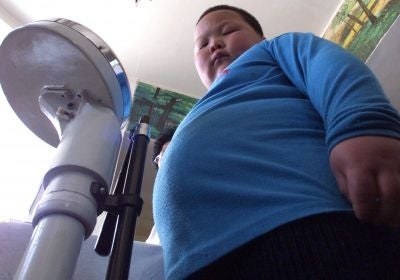Your support helps us to tell the story
From reproductive rights to climate change to Big Tech, The Independent is on the ground when the story is developing. Whether it's investigating the financials of Elon Musk's pro-Trump PAC or producing our latest documentary, 'The A Word', which shines a light on the American women fighting for reproductive rights, we know how important it is to parse out the facts from the messaging.
At such a critical moment in US history, we need reporters on the ground. Your donation allows us to keep sending journalists to speak to both sides of the story.
The Independent is trusted by Americans across the entire political spectrum. And unlike many other quality news outlets, we choose not to lock Americans out of our reporting and analysis with paywalls. We believe quality journalism should be available to everyone, paid for by those who can afford it.
Your support makes all the difference.Whether or not your child becomes obese could greatly depend on parental behavior and the home environment, a new study reports.
Researchers from the University of Sydney examined what they call the ''obesogenic'' potential of households by looking at factors such as soda consumption, television habits, and exercise.
They polled 1,685 school-aged children and their parents to generate data about how household habits and parental controls effected obesity risk.
In the study factors that reduced a child's chances of becoming obese were:
- Parents who closely watched their child's intake of soft drinks
- Parents who inspired exercise
- Parents who set clear rules about television watching
- Eating breakfast
- Drinking water with meals
Factors that increased the risks of obesity in children were:
- Soft drinks being available at home
- Television in the child's room
- Dining on fast food
- Dining in front of the television
- Taking short car trips of less than a mile
Another recent study found that the more mothers work during their children's lifetimes, the more likely their kids are to be overweight or obese. In this study, researchers from American University in Washington DC, Cornell University in New York State and the University of Chicago studied data on more than 900 elementary- and middle-school-aged children in 10 US cities. They were unable to clearly explain the findings but theorized that because working mothers have little time to shop for healthy food and prepare meals, they and their children eat more fast- and packaged foods, which tend to be high in fat and calories.
The latest study was published July 4 in the journal Pediatrics. Access it here: http://pediatrics.aappublications.org/content/early/2011/06/29/peds.2010-3331.abstract?papetoc

Join our commenting forum
Join thought-provoking conversations, follow other Independent readers and see their replies
Comments